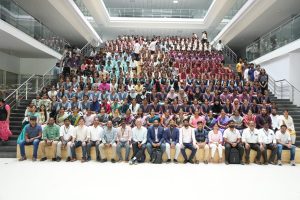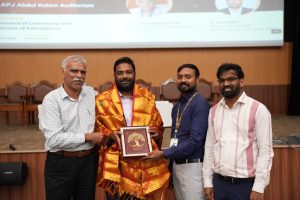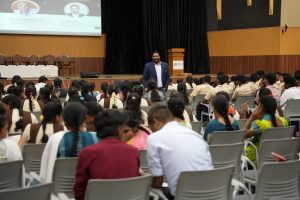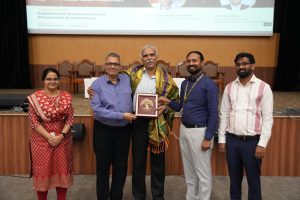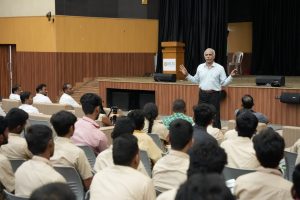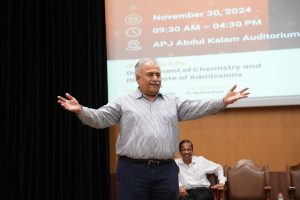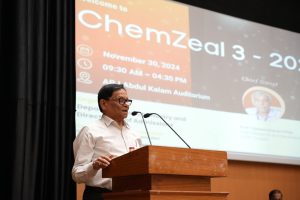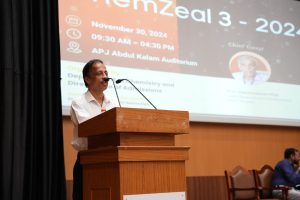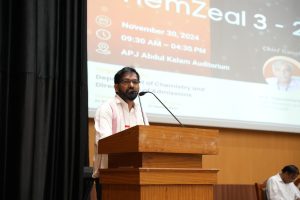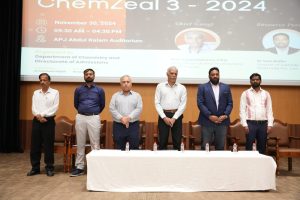Inspiring Future Chemists at ChemZeal 3
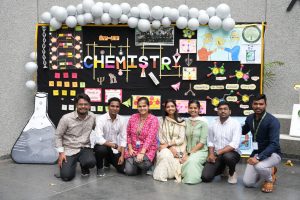 On November 30, 2024, the Department of Chemistry, in collaboration with the Directorate of Admissions, hosted ChemZeal 3, a flagship event that showcased the ever-expanding scope of chemistry in today’s world. The event was graced by prominent personalities, including the Chief Guest, Prof. Vijayamohanan Pillai, Dean of Research & Development at IISER Tirupati, and Dr Veerababu, Director of Cathode, GODI India Pvt. Ltd., Hyderabad, who served as the resource person.
On November 30, 2024, the Department of Chemistry, in collaboration with the Directorate of Admissions, hosted ChemZeal 3, a flagship event that showcased the ever-expanding scope of chemistry in today’s world. The event was graced by prominent personalities, including the Chief Guest, Prof. Vijayamohanan Pillai, Dean of Research & Development at IISER Tirupati, and Dr Veerababu, Director of Cathode, GODI India Pvt. Ltd., Hyderabad, who served as the resource person.
The event began with a welcome address by the convener, Dr Satheesh Ellipilli, who provided an insightful overview of the programme and reflected on the immense success of the previous editions, ChemZeal 1 and 2. He expressed excitement about the growth of the event and its contribution to advancing the knowledge and application of chemistry in various fields.
Following the welcome, the Head of the Department of Chemistry delivered an inspiring speech, offering a comprehensive overview of the department. Dr Pardha Saradhi Maram, Associate Professor and Head highlighted the department’s commitment to academic excellence, research innovation, and fostering an environment where students can explore the transformative power of chemistry.
One of the major highlights of the event was the launch of the “Post a Q” portal by Vice Chancellor, Prof. Manoj K Arora. The portal aims to provide a platform for students and researchers to ask questions and seek solutions in the realm of chemistry. During the launch, Prof. Arora remarked, “Chemistry is such a wonderful science that, no matter what you think of, you will find chemistry in it.” This statement underscored the far-reaching impact of chemistry on everyday life and innovation.
The keynote address by the Chief Guest, Prof. Vijayamohanan Pillai, focused on generating and storing clean energy. He discussed the pivotal role that chemistry plays in developing sustainable solutions for energy storage and generation, from battery technologies to renewable energy sources. Prof. Pillai’s talk resonated with the audience, particularly in the context of the growing need for clean energy in the face of global environmental challenges.
The resource person, Dr Veerababu, shared valuable insights into cathode materials and their applications in the energy sector. His expertise in battery technology and his role at GODI India added depth to the discussions, providing students and faculty with a practical perspective on the industry’s current advancements.
ChemZeal 3 successfully fostered a spirit of collaboration and intellectual curiosity, highlighting the dynamic nature of chemistry and its potential to address some of the world’s most pressing issues. The event concluded with a vote of thanks, acknowledging the contributions of all the speakers, participants, and organisers who made the day a resounding success.
- Published in Chemistry-news, Departmental News, News
Research on Vehicle Density Detection Granted a Patent
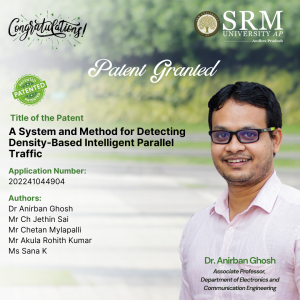 Research Scholars Chetan Mylapilli, Jethin Sai Chilukuri, Rohith Kumar Akula, Sana Fathima, and Assistant Professor Dr Anirban Ghosh from the Department of Electronics and Communication Engineering at SRM University-AP have co-authored an innovative paper titled “A System and Method for Detecting Density-Based Intelligent Parallel Traffic.” This pioneering research delves into the development of an intelligent traffic control system that dynamically adjusts traffic signals based on real-time vehicle density analysis, their research with the patent no- 202241044904 represents a significant step in integrating technology with transportation efficiency.
Research Scholars Chetan Mylapilli, Jethin Sai Chilukuri, Rohith Kumar Akula, Sana Fathima, and Assistant Professor Dr Anirban Ghosh from the Department of Electronics and Communication Engineering at SRM University-AP have co-authored an innovative paper titled “A System and Method for Detecting Density-Based Intelligent Parallel Traffic.” This pioneering research delves into the development of an intelligent traffic control system that dynamically adjusts traffic signals based on real-time vehicle density analysis, their research with the patent no- 202241044904 represents a significant step in integrating technology with transportation efficiency.
Abstract
This work presents an intelligent traffic control system that addresses the gaps in the current state-of-the-art by using a novel hardware-software integration. The system evaluates traffic density in each lane direction and dynamically adjusts traffic lights using a computational algorithm to significantly reduce waiting times at junctions. It also ensures safe pedestrian movement and enables parallel traffic flows. A Raspberry Pi serves as the system’s control unit, utilizing video processing to determine traffic density, while LEDs simulate the traffic lights. The system integrates various hardware and software components, including Raspberry Pi, LEDs, relay modules, VNC software, and sample traffic videos, to provide an efficient solution to the traffic management problem.
Explanation of Research in Layperson’s Terms
The current system uses a Raspberry Pi to control traffic lights based on real-time video of cars at intersections. It detects how many vehicles are in each lane and adjusts the lights to reduce waiting time. Pedestrian safety is managed by ensuring safe crossing times. LED lights simulate the traffic signals, and the system allows smoother traffic flow by handling vehicles moving in parallel. However, it can’t yet control turning vehicles or prioritize emergency vehicles.
Practical Implementation of the Research
The intelligent traffic control system significantly reduces congestion by dynamically adjusting traffic signals, leading to shorter wait times and smoother commutes. It helps lower pollution and fuel consumption by minimizing idle time at junctions, contributing to better air quality and conservation of resources. Pedestrian safety is improved through designated crossing times, reducing accidents. The system also supports economic growth by cutting time wasted in traffic, enhancing productivity.
Future Research Plans
Future research will focus on adding control for turning traffic and distinguishing between different vehicle types to enable emergency vehicle priority. To improve real-time video processing, the system will transition from Raspberry Pi to more efficient hardware like FPGAs or GPUs. Machine learning will be explored for better vehicle detection and traffic signal optimization. Integration with V2X communication will enhance traffic management, and real-world scalability will be tested for deployment in smart city environments.
The prototype:
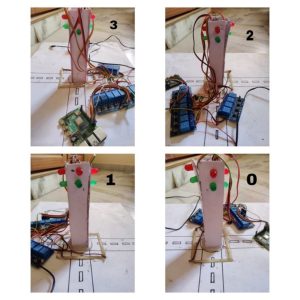


Figure 1. Image of the prototype
Figure 2. Working prototype
Figure 3. Block Diagram of the prototype
- Published in Departmental News, ECE NEWS, News, Research News
Faculty Collaborate on Interdisciplinary Innovation
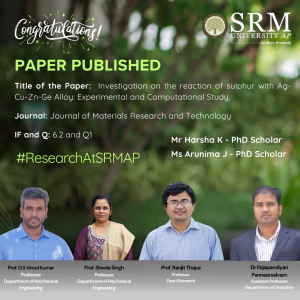 In an inspiring collaboration, Prof. G S Vinod Kumar and Prof. Sheela Singh from the Department of Mechanical Engineering, Prof. Ranjit Thapa from the Department of Physics, and Dr Rajapandiyan Panneerselvam from the Department of Chemistry at SRM University – AP, along with PhD scholars Ms Harsha K and Ms Arunima J, have co-authored a compelling paper titled “Innovative Approaches to Enhancing the Tarnish Resistance of Silver Alloys.” This groundbreaking research focuses on developing new silver alloys that resist tarnishing, enhancing durability and aesthetic appeal for applications in the jewellery industry. Together, they are paving the way for innovative solutions that blend science with artistry.
In an inspiring collaboration, Prof. G S Vinod Kumar and Prof. Sheela Singh from the Department of Mechanical Engineering, Prof. Ranjit Thapa from the Department of Physics, and Dr Rajapandiyan Panneerselvam from the Department of Chemistry at SRM University – AP, along with PhD scholars Ms Harsha K and Ms Arunima J, have co-authored a compelling paper titled “Innovative Approaches to Enhancing the Tarnish Resistance of Silver Alloys.” This groundbreaking research focuses on developing new silver alloys that resist tarnishing, enhancing durability and aesthetic appeal for applications in the jewellery industry. Together, they are paving the way for innovative solutions that blend science with artistry.
Abstract
Silver and its alloys undergo tarnishing with time, which is a black stain on the surface due to the formation of Ag2S. Developing a tarnish resistant Ag alloy was attempted by alloying Ag with elements that form a passive oxide layer on the surface. Germanium is proven to provide better tarnish resistance to sterling silver alloy (92.5wt.% pure) which is available under the trade name of Argentium©. The present work investigates the tarnish resistance behaviour of sterling silver alloy (92.5wt.% pure) containing various additions of Copper, Zinc, Germanium, Aluminium, Beryllium, Titanium, Zirconium, and Magnesium. The alloys were prepared by melting and casting route, followed by Passivation Heat Treatment (PHT) to create a stable and continuous oxide layer. The temperature for PHT was optimized using thermogravimetry analysis (TGA) of the alloys prepared. An accelerated tarnish test was carried out to investigate the tarnishing behaviour of alloy samples obtained before and after PHT. The samples were characterized using XRD, SEM-EDX, TG-DSC, micro-Raman Spectroscopy, and XPS. The change in reflectance of the samples after the tarnish test is determined using UV-visible reflectance spectroscopy. The mechanism behind the tarnish resistance was derived using Density Functional Theory (DFT) by comparing sulphur (S2) and Oxygen (O2) adsorption energies (BE) of the alloying elements.
Explanation of the Research in layperson’s terms
Age-old silver pieces are found in different colours ranging from light yellow(silver Jewellery pieces after a few weeks of usage) to black(archaeological silver pieces). They look different in terms of the metallic white colour and lustrous appearance from fresh silver. This demeans silver and thus affects its market. The major cause of the staining of silver is the interaction of individual silver particles with some elements found common in the atmosphere. We work on the prevention of this staining of silver. For the study, silver is incorporated with other elements which makes silver less interacting with staining elements in the atmosphere. These additional elements create a layer over silver so that it is protected. The appropriate elements are identified by using modelling using computer software. After obtaining appropriate elements, the experimental trials are also done with the same elements until stainless silver is obtained. Then, what happens to the added elements inside silver is also studied by using modern microscopic technics.
Practical/Social Implications of the Research
The major application of the invention is in the jewellery industry. The problem of tarnishing is an age-old threat in jewellery making. The alloys we proposed could be used to make quality silver jewellery/articles that can sustain the colour and lustre for a longer period. This will stop the hesitation from jewellery designers and industries to try intricate designs in silver and find a better market for them. The alloys based on the proposed composition show good grain refinement and thus high hardness. This strengthens the soft silver and improves the range of its applications from low hardness articles to high. The alloys based on the proposed composition have high tensile strength. They deform plastically for a wide range of stress values and will not break easily.
Collaborations:
Waman Hari Pethe & Sons Jewellery
Future Research Plans:
1. Corrosion studies of silver alloys to understand the behaviour in solutions having compositions similar to that of sweat.
2. Study of mechanical properties of silver alloys to develop workable alloys of sterling silver which could be used for jewellery manufacturing
3. Identification of elements having better oxide layer formation when alloyed with silver, by using computational techniques and experimental studies of their properties.
Link to the article:
https://www.sciencedirect.com/science/article/pii/S2238785424024633
- Published in Chemistry-news, Departmental News, Mechanical Engineering NEWS, News, Physics News, Research News
Patent Published on Segmentation of Kidney Abnormalities
 Prompt and timely disease detection forms an essential part of any treatment, Dr Pradyut Kumar Sanki, Dr Swagata Samanta, and research scholar Ms Pushpavathi Kothapalli from the Department of Electronics and Communication Engineering have worked towards a timely and accurate disease detection when it comes to kidney disease diagnosis through medical images. Their innovative research titled, “A System and a Method for Automated Segmentation of Kidney Abnormalities in Medical Images” has been published in the patent journal with Application No. 202441074765 and has significant potential for clinical adoption, improving patient care in kidney disease detection and treatment.
Prompt and timely disease detection forms an essential part of any treatment, Dr Pradyut Kumar Sanki, Dr Swagata Samanta, and research scholar Ms Pushpavathi Kothapalli from the Department of Electronics and Communication Engineering have worked towards a timely and accurate disease detection when it comes to kidney disease diagnosis through medical images. Their innovative research titled, “A System and a Method for Automated Segmentation of Kidney Abnormalities in Medical Images” has been published in the patent journal with Application No. 202441074765 and has significant potential for clinical adoption, improving patient care in kidney disease detection and treatment.
Abstract:
This research work aimed to develop an effective method for segmenting kidney diseases, including kidney stones, cysts, and tumours. The method achieved high accuracy in segmenting kidney diseases, with a good mean precision, and recall. The study employed techniques to efficiently select the most relevant features for kidney disease segmentation, identifying key features related to imaging and patient health. The method outperformed other approaches in terms of accuracy, precision, and recall. The study utilized a comprehensive dataset of kidney disease patients to train and test the segmentation method effectively. The results suggest that this method has the potential to be widely adopted in clinical settings, contributing to more accurate and efficient diagnostic tools for kidney disease segmentation and improving patient care in an effective manner.
Practical Implementation:
The practical implementation of the research involves deploying a system for real-time segmentation of kidney diseases, including kidney stones, cysts, and tumours. The method achieved high accuracy in segmenting kidney diseases using deep learning techniques. The model can quickly identify and delineate diseased areas within the kidney. The study employed techniques to select the most relevant features for kidney disease segmentation, focusing on key imaging and health-related characteristics. The method outperformed other approaches in terms of accuracy, precision, and recall. The study utilized a comprehensive dataset of kidney disease patients to train and test the segmentation method. The results suggest that the method has the potential to be widely adopted in clinical settings, contributing to more accurate and efficient diagnostic tools for kidney disease segmentation and improving patient care.
Future Research Plans:
The future plans for the work on chronic kidney disease (CKD) detection and segmentation involve several key areas:
Expanding Disease Coverage: Future research could involve adapting and expanding the segmentation model to detect and segment other kidney-related abnormalities and diseases, such as renal infections or congenital disorders, thereby increasing the versatility and applicability of the tool.
Improving Model Accuracy and Robustness: To further improve accuracy, additional deep learning techniques, such as ensemble learning or advanced attention mechanisms, could be explored. Testing on larger and more diverse datasets could help make the model more robust and generalizable across various patient demographics and imaging devices.
Integration with Multi-modal Data: Incorporating other data types, such as blood test results, genetic markers, or electronic health records, could be an exciting avenue to explore. This would create a multi-modal approach, combining imaging data with clinical information, potentially improving diagnostic accuracy and providing more comprehensive insights into kidney health.
Real-world Clinical Trials: Conducting clinical trials in real-world settings to validate the effectiveness of the segmentation tool with healthcare professionals. Gathering feedback from these trials would provide valuable insights into user experience and model performance, facilitating further refinement.
Developing a User-friendly Interface: Future work could involve creating an easy-to-use interface that seamlessly integrates with hospital systems. This interface would allow healthcare providers to interact with the segmentation results, adjust parameters, and view comprehensive diagnostic reports.
Exploring Semi-supervised and Unsupervised Learning Approaches: To reduce the reliance on labeled data, which can be time-consuming to obtain, exploring semi-supervised or unsupervised learning techniques could be beneficial. These approaches might help in training the model on large datasets without extensive labeling, thereby improving scalability.
Longitudinal Studies for Prognostic Analysis: Research could also focus on tracking patients over time to understand how kidney disease progresses and how segmentation results correlate with long-term health outcomes. This could help in creating predictive models for disease prognosis.

- Published in Departmental News, ECE NEWS, News, Research News


